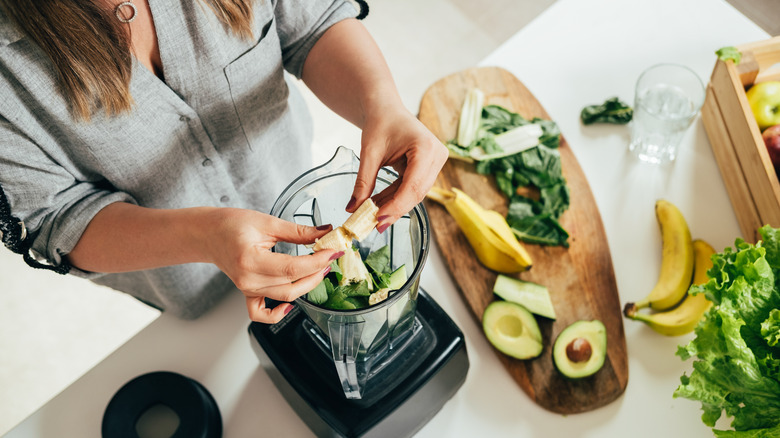What Happens To Your Body If You Eat The Same Meals Everyday
We all have to eat every day, and sometimes it can feel like a chore. It can be tiring trying to plan your meals for the day ahead, and it's so easy to just make your favorite sandwich or order that takeout meal you enjoyed yesterday. While it's common knowledge that not all foods are great for your body, what happens if you eat the same meals every single day?
Maybe you don't have time to constantly try different recipes, or you simply love your favorite foods so much that you want to eat them all the time, so you turn to having the same thing over and over again. The problem is, gut health is a vital part of a functioning body, and not eating a variety of nutritious foods can seriously affect it.
"Gut health relates to the functioning of our entire digestive tract," dietitian Megan Rossi shared in a conversation with Trinny London, adding, "70% of our immune system lives along that 9-meter digestive tract." She also noted that the state of your gut can directly affect your mental health. "Clinical trials have now supported [the idea] that nourishing the gut through a gut-boosting diet can have clinically relevant improvements on people's mental health," Rossi stated. While you can improve your gut health beyond eating right, the foods we ingest have the biggest impact. So, if you're not feeling your best but can't figure out why, it's high time to stop eating the same foods every day; your gut microbiome will thank you.
The gut needs a variety of nutrients to thrive
While eating the foods you love every day is something anybody would enjoy, it might not be the best for your body and overall health. The effects of this obviously depend on the type of food you're eating, and your body surely won't react to salads the same way it will react to junk food. However, according to microbiome scientist Tim Spector, eating the same meals every day, whether they are healthy or not, can have a serious impact on your gut health, .
When speaking to Well+Good, Spector noted that consuming overly-processed foods that lack nutrients is the worst-case scenario for maintaining gut health in the long run. He lists depression, cancer, and Alzheimer's disease as possible health issues one can develop over time if the foods one consumes aren't nutritious. Not only are there long-term consequences to eating the same nutrient-poor food, but you'll quickly feel the effects of the processed oils, sugars, and additives through digestive problems, low energy, and brain fog, Spector says.
If this makes you think you're in the clear just because you're eating the same healthy foods every day, you're wrong. While nutritious ingredients are much better for your gut than processed food, you can still harm your gastrointestinal health by not eating a variety of nutrients. Spector emphasizes that eating the same meals, even though healthy, will not provide "the diversity of gut microbes" that's needed for a healthy gut.
Add new ingredients to your favorite meals
The best and easiest way to keep your gut health at its prime is to focus on nutrient-dense foods that will work for you and not against you, says Vincent Pedre, a medical doctor and gut health expert. "The types of foods we eat regulate the types of microorganisms that call the gut home," Pedre explained when speaking to Real Simple. He recommends including prebiotic-rich foods for a gut boost, such as garlic, onions, and leeks. High-fiber foods like artichokes, fennel, and spinach will aid digestion, while Brussels sprouts and broccoli are great for added vitamins.
Repeating your meals might be a time-saving move, and it definitely eliminates the trouble of figuring out what to eat, but it's not the best idea to do it every day. Flavor fatigue is a real thing, and you'll get bored real quick. Losing weight is a common reason people tend to gravitate towards the same meals every day, but not eating a variety of nutrient-rich foods could actually stall your weight loss journey, according to a study published by the Journal of Nutrition.
For example, sweet potato is a carb-loaded food that's ideal for weight loss, and you might be missing out on its benefits if you're chomping on the same salad over and over. Including your favorite foods in meals on a daily basis is great for staying motivated when trying to eat healthy, but remember to switch it up from time to time with a new ingredient.


